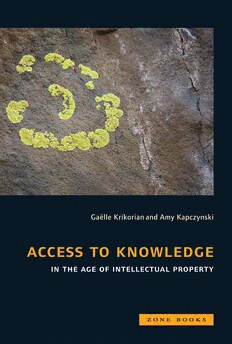Download Access to knowledge in the age of intellectual property PDF Free - Full Version
Download Access to knowledge in the age of intellectual property by Gaëlle Krikorian, Amy Kapczynski (editors) in PDF format completely FREE. No registration required, no payment needed. Get instant access to this valuable resource on PDFdrive.to!
About Access to knowledge in the age of intellectual property
At the end of the twentieth century, intellectual property rights collided with everyday life. Expansive copyright laws and digital rights management technologies sought to shut down new forms of copying and remixing made possible by the Internet. International laws expanding patent rights threatened the lives of millions of people around the world living with HIV/AIDS by limiting their access to cheap generic medicines. For decades, governments have tightened the grip of intellectual property law at the bidding of information industries; but recently, groups have emerged around the world to challenge this wave of enclosure with a new counter-politics of “access to knowledge” or “A2K.” They include software programmers who took to the streets to defeat software patents in Europe, AIDS activists who forced multinational pharmaceutical companies to permit copies of their medicines to be sold in poor countries, subsistence farmers defending their rights to food security or access to agricultural biotechnology, and college students who created a new “free culture” movement to defend the digital commons.Access to Knowledge in the Age of Intellectual Property maps this emerging field of activism as a series of historical moments, strategies, and concepts. It gathers some of the most important thinkers and advocates in the field to make the stakes and strategies at play in this new domain visible and the terms of intellectual property law intelligible in their political implications around the world.A Creative Commons edition of this work will be freely available online.
Detailed Information
| Author: | Gaëlle Krikorian, Amy Kapczynski (editors) |
|---|---|
| Publication Year: | 2010 |
| ISBN: | 9781890951979 |
| Pages: | 652 |
| Language: | English |
| File Size: | 6.439 |
| Format: | |
| Price: | FREE |
Safe & Secure Download - No registration required
Why Choose PDFdrive for Your Free Access to knowledge in the age of intellectual property Download?
- 100% Free: No hidden fees or subscriptions required for one book every day.
- No Registration: Immediate access is available without creating accounts for one book every day.
- Safe and Secure: Clean downloads without malware or viruses
- Multiple Formats: PDF, MOBI, Mpub,... optimized for all devices
- Educational Resource: Supporting knowledge sharing and learning
Frequently Asked Questions
Is it really free to download Access to knowledge in the age of intellectual property PDF?
Yes, on https://PDFdrive.to you can download Access to knowledge in the age of intellectual property by Gaëlle Krikorian, Amy Kapczynski (editors) completely free. We don't require any payment, subscription, or registration to access this PDF file. For 3 books every day.
How can I read Access to knowledge in the age of intellectual property on my mobile device?
After downloading Access to knowledge in the age of intellectual property PDF, you can open it with any PDF reader app on your phone or tablet. We recommend using Adobe Acrobat Reader, Apple Books, or Google Play Books for the best reading experience.
Is this the full version of Access to knowledge in the age of intellectual property?
Yes, this is the complete PDF version of Access to knowledge in the age of intellectual property by Gaëlle Krikorian, Amy Kapczynski (editors). You will be able to read the entire content as in the printed version without missing any pages.
Is it legal to download Access to knowledge in the age of intellectual property PDF for free?
https://PDFdrive.to provides links to free educational resources available online. We do not store any files on our servers. Please be aware of copyright laws in your country before downloading.
The materials shared are intended for research, educational, and personal use in accordance with fair use principles.

